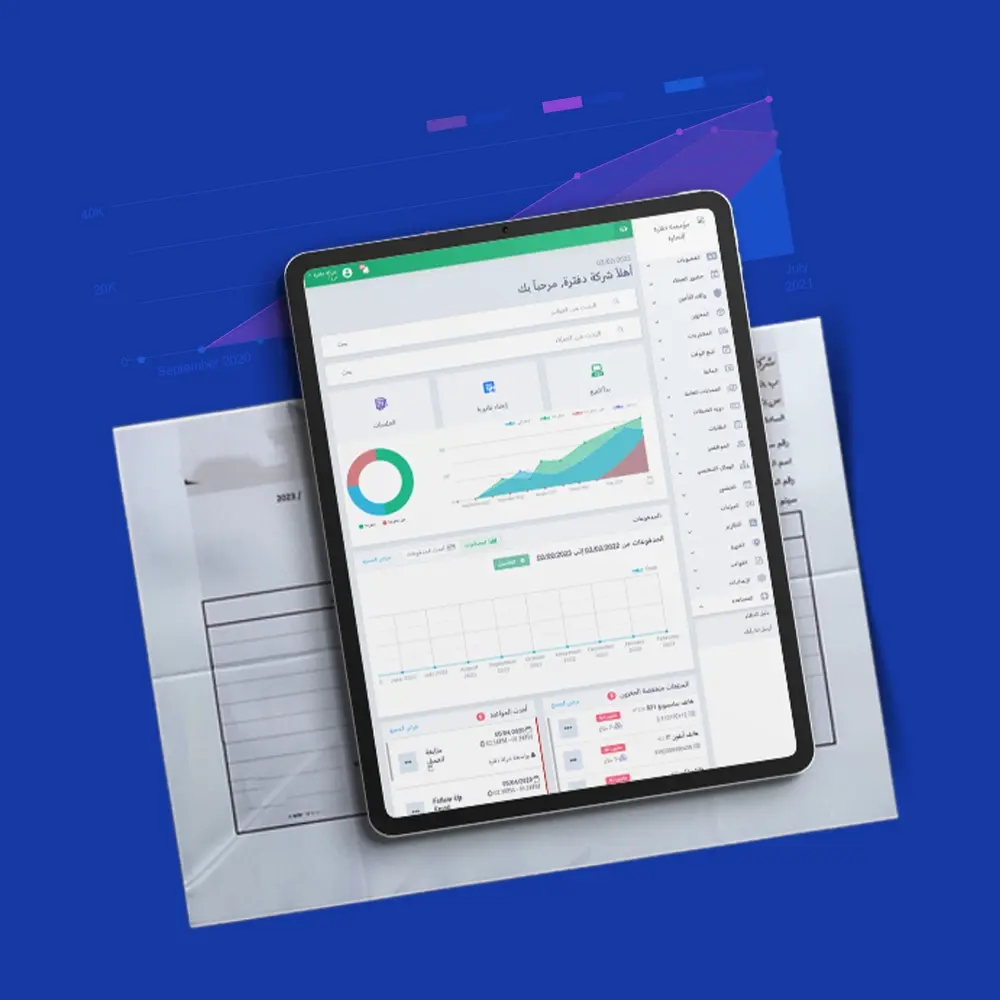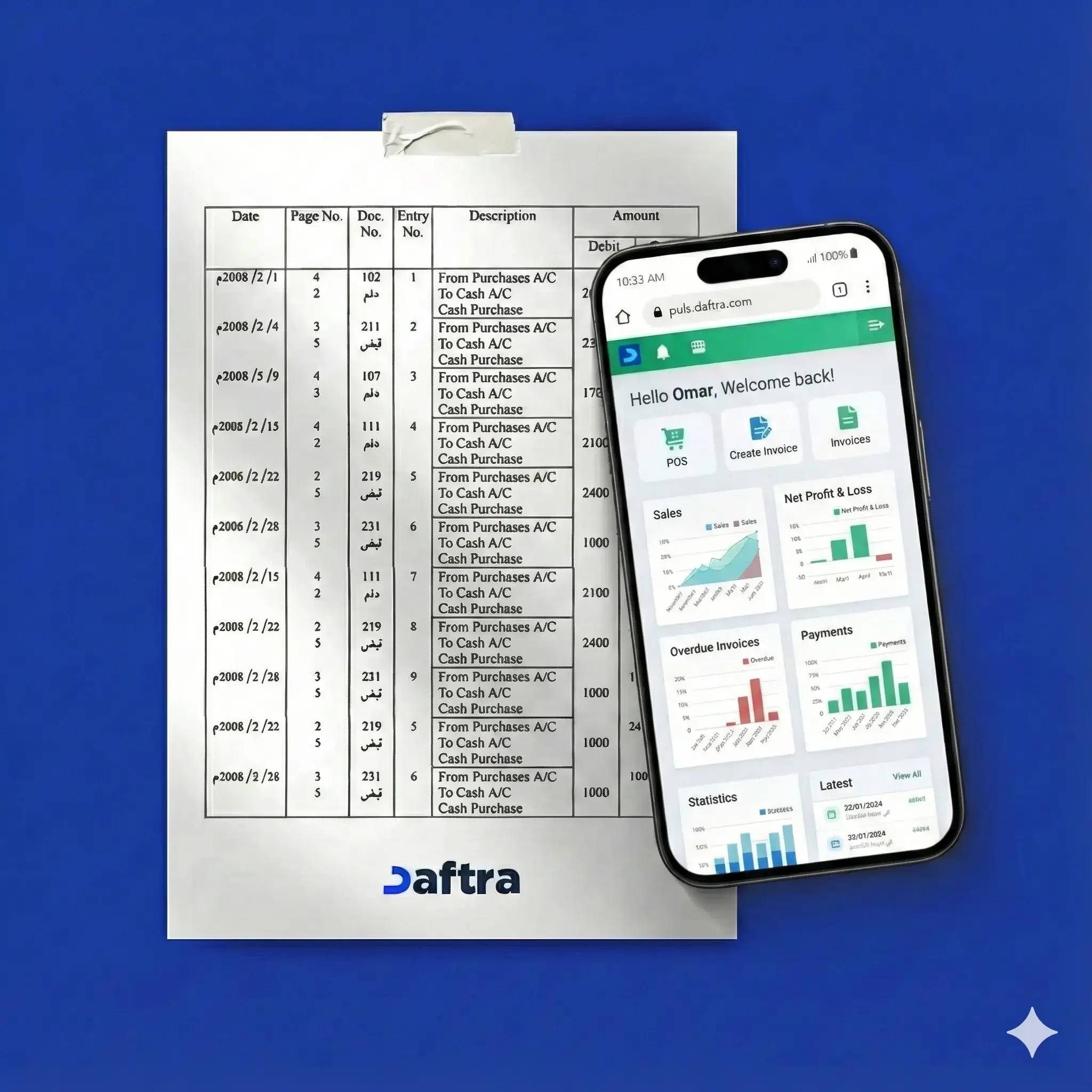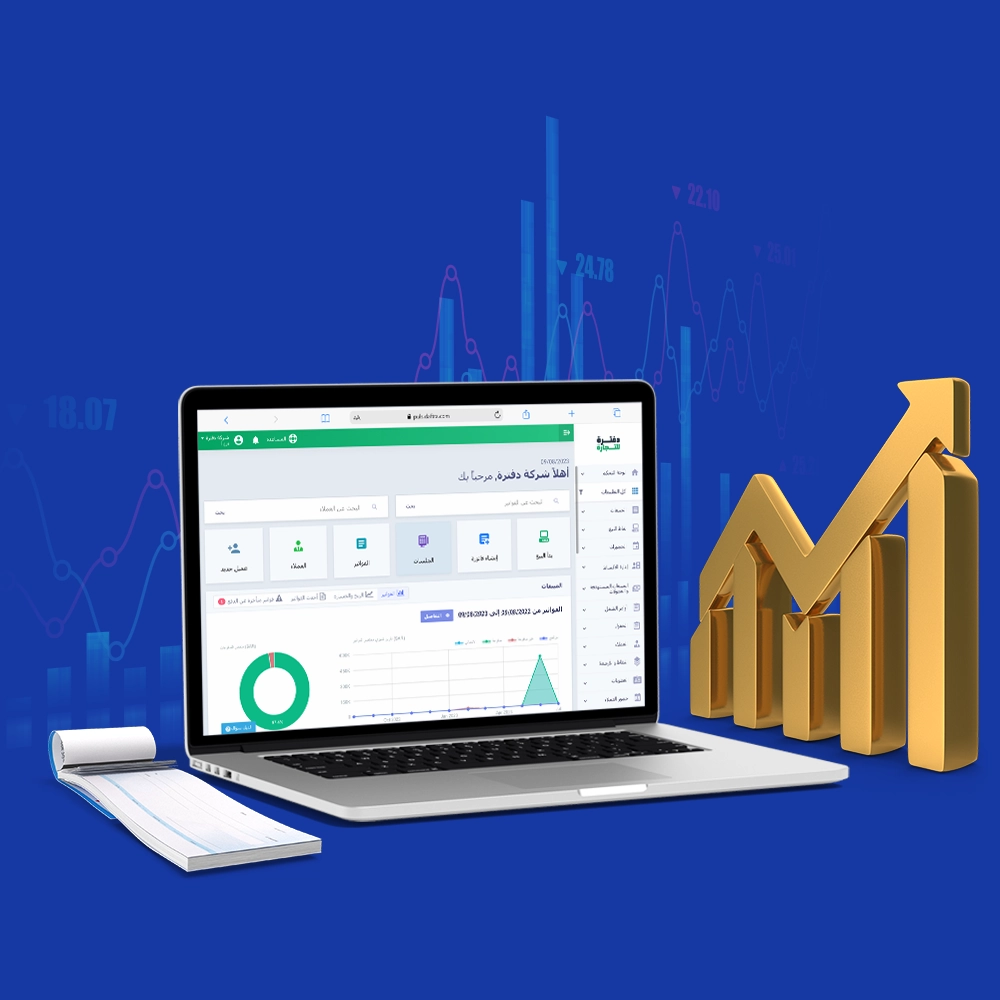A Comprehensive Guide to Construction Accounting and How It's Applied

Table of contents:
- Definition of Construction Accounting
- What are the Characteristics of Construction Accounting?
- How Are Calculations Performed in Construction Accounting?
- Accounting Progress Billing in Construction Accounting
- Uses and Functions of Construction Accounting
- Why is Daftra the Best System for Managing Construction Accounting Companies?
Have you ever heard of supermarket accounting? Or doctors' and pharmacists' accounting, or e-commerce accounting? Certainly, you haven't, as there are no specialized types of accounting for each field - rather, it's general accounting with its principles applied to all sectors. However, you may have heard of construction accounting and learned that it's the only sector among businesses that has its own unique accounting type. This prompts us to ask: why does construction accounting necessitate the creation of a new accounting type for itself alone?
There are other sectors that are equally vital and important to society, even more so. There are other fields that generate more profits, and there are more complex technical specializations. Yet, no sector other than construction requires accounting rules that apply specifically to it and not to others. Therefore, we will try to explore together the world of construction accounting and how to apply it optimally.
Definition of Construction Accounting
Construction accounting is a branch of accounting that performs calculations related to the costs of large projects, such as roads, bridges, and building projects. Construction accounting is considered a part of cost accounting, through which all details related to project costs are determined from the initial tender announcement, through various preparations related to the project, until project completion and delivery to the responsible party.
It is also closely related to other accounting branches, such as financial accounting, which focuses on the immediate recording of accounting operations and then analyzing data from these operations to derive financial information useful for decision-making.
Financial reports and statements are released so that interested parties, such as investors, banks, employees, and managerial accounting professionals, can access them. The purpose of managerial accounting is to organize, control, plan, and manage internal operations, and its data is not disclosed to external parties, unlike financial accounting.
Typically, companies seeking to enter a tender purchase the conditions document, which provides a detailed explanation of the tender subject. They then study the prices to submit a bid to the company that has announced the tender, while considering the payment of tender entry insurance or providing an initial guarantee as specified in the tender conditions.
Additionally, there are many accounts included in construction accounting, such as: project cost account, customer account, advance payments from customers account, and customer guarantee retention account. Each of these accounts has a framework that divides them.
What are the Characteristics of Construction Accounting?
Whether you're still using traditional accounting methods in written ledgers or one of the cloud accounting software programs, you'll find differences between construction accounting books and entries compared to other fields that are specific only to general accounting. This is due to the unique characteristics of construction work, which make it a distinct type of activity that requires a specialized accounting method to facilitate its operations and simplify them. What are the key characteristics of construction accounting that distinguish it from other businesses?
Construction Accounting's Reliance on a Project-Based Approach
Often, all operations in a company revolve around a single project that is charged to one cost center, or more if you want greater precision, such as knowing what profits each department and its employees generate versus costs. However, construction accounting separates each project the company works on, and each project is charged to a separate cost center.
This means that if you have three construction operations - one residential buildings in Jeddah, the second a school complex in Riyadh, and the third also residential buildings in Dammam - each operation is considered an independent project serving a specific client. The costs related to each project and the profit returns from it are calculated, and management is conducted separately and flexibly to meet the needs of each project individually. This makes the accounting operations different - for example, issuing invoices is called construction progress billing and is done in successive installments throughout the project's lifespan, not paid all at once after completion as is usual in other sectors.
Long-term Construction Project Contracts
In trade-based businesses, the relationship between the two parties of the commercial transaction typically lasts only for the duration of the selling period. In manufacturing-based sectors, the relationship between the manufacturer and the buyer typically begins after the manufacturing process, when the product is ready for sale.
However, in contracting, the relationship between the contractor (seller) and the client (buyer) begins at the planning stage, preceding implementation, and continues for extended periods that may span years. This makes creating an accounting method that includes production costs, incorporates tax accounting, and organizes the payment process extremely important.
Decentralized Production Process
When you want to review the accounting operations of manufacturing-based companies, you are subject to calculating production costs associated with a specific manufacturing center in what is known as the production line. However, in the contracting field, work is conducted at multiple construction sites, and construction tools involved in the building process, which is considered the manufacturing process here, are transferred from one site to another.
This means re-evaluating production costs and the difficulty of maintaining a large centralized inventory, leading to a lack of stability or consistency in estimating costs and profits, as well as transportation costs and different depreciation rates due to varying productive machine life. Additionally, numerous accounting variables make construction accounting a unique subject.
How Are Calculations Performed in Construction Accounting?
We often hear that international accounting standards are rules that must be relied upon, regardless of a business's activity or country, as well as Islamic accounting standards adopted by some institutions. These are the same rules that apply to construction accounting, with some specialization tailored to the field's unique nature.
Therefore, here are the most important accounts related to construction accounting, keeping in mind that these books can be changed and rearranged according to what suits your work:
- Project Cost Account: In this account, all project costs and expenses are recorded in accordance with the conditions document and subsequent expenses. The cost account is then divided into salaries and wages, resources, and subcontractor work. This division is characterized by facilitating monitoring procedures, clarifying all deviations that occur between costs and estimates, as well as actual costs in accordance with the specified project timeline.
- Customer Account: This is considered the accounts receivable account for project owners. It records the customer account that is owed to the project owner, in addition to recording all dues payable to the project owner, in order to issue a payment certificate for the total work.
- Advance Payments from Customers' Accounts: This account records the first payment received from the customer upon contract signing. It is estimated at a recognized percentage of 10% of the project value or the percentage specified in the contract, and the payment value is consumed at the same percentage obtained from progress payments.
- Customer Guarantee Retention Account: This account includes the entry of the deducted percentage that the customer has withheld, which represents progress payments in exchange for guaranteeing the agreed maintenance period when contracting the project. It is disbursed with a bank guarantee issued by the company in favor of the customer. It is a retained guarantee bond and is returned after the contractual maintenance period ends.
- Materials Account: All materials purchased during project phases are recorded.
- Subcontractor Work: This is specific to work assigned to subcontractors, attached with their names, the work they perform, and costs.
- Miscellaneous Expenses: The remaining expenses are placed here, such as depreciation, social insurance, and sales tax.
- Wages: This is an account specific to the wages of your workers, whether they are full-time or part-time, serving a specific purpose related to the project.
Accounting Progress Billing in Construction Accounting
Progress billing in construction accounting consists of three types: executive progress billing, financial progress billing, and final progress billing. Each is clarified as follows:
- Executive Progress Billing: This represents monitoring of the project and implementation phases from the construction company's perspective. It doesn't differ much in content from current or final progress billing, but it includes some analytical data specific to each item, such as item cost, selling price, and profitability. Additionally, it is an internal extract that is not submitted to external parties. It is considered a permanent indicator throughout the project duration for comparing planning and implementation for all project items. This extract is prepared periodically according to what is agreed upon with the project owner.
- Financial Progress Billing: This is considered an invoice submitted by the construction company executing the project to the project owner (client). It calculates the net value of the progress billing based on what has been implemented, taking into account what was previously implemented, along with settlements related to the items subject to the progress billing from deductions such as insurance and items that arise after signing the agreement contract, as well as the expected completion percentage from the consulting engineer.
- Final Progress Billing: This is what is submitted when the construction company finishes implementing the project and delivers it. It is also called the final extract.
Uses and Functions of Construction Accounting
Does construction work need an accountant specialized in the field who cannot be replaced by any other accountant? Aren't construction accounting entries like governmental accounting entries that calculate revenues and expenses even if the terminology differs slightly? Don't the same legal accounting standards that preserve the integrity of the accounting system apply to construction accounting - the same laws as any other accounting type? So why do we need an accountant specialized in construction? And what are the uses of construction accounting that distinguish it from any other accounting type?
- The construction field has intertwined parties with massive investments pumped into it, and has a different nature of work that depends on projects. Therefore, construction accounting was specialized to manage this type of business with its complexities and differences from other accounting types.
- Construction accounting is responsible for closely following project-related documents, starting from the conditions document, then the contract between the construction company and the client or contracts with subcontractors, and all conditions and requirements, to reviewing progress billing and guarantee letters of all types. This is a more complex process than the simple accounting process in other businesses.
- Issuing reports and financial statements, using electronic accounting software to issue them, and controlling all other transactions.
- Construction accounting overlaps with tax laws related to contracting, which requires clarifying tax percentages related to each project item, for filing tax returns and recovering due taxes, among others.
- Issuing bank guarantee letters, writing applications, and stating accounting aspects that support approval of the letters.
- Tracking customer collections and matching them with the time period and required progress billing.
- Recording daily accounting entries while considering their classification in progress billing.
- Assisting contractors, engineers, and others who work for you with important accounting and financial information. For example, an engineer may need some support to control financial progress billing, which the construction accountant provides.
- Contributing to the financial and accounting review process to ensure the avoidance of the use of creative accounting methods and other illegitimate methods.
- Preparing material supply progress billing.
- Reviewing and recording customer and subcontractor progress billing.
- Delivering invoices and subcontractor dues to financial management.
- Reviewing, settling, and recording cash expenses from custody.
- Following up on agreed financial payment disbursements with suppliers and subcontractors.
- Following up on the project's progress and completion percentage with the specialized engineer.
- Following up with the site engineer regarding progress billing and guarantee letters.
However, the most distinctive task that characterizes construction accounting from other accounting types is preparing production reports. This requires following up on work completion percentages periodically.
Why is Daftra the Best System for Managing Construction Accounting Companies?
Daftra provides you with a specialized system for managing accounts of contracting, construction, and real estate investment companies. It allows you to issue progress billing, separate contracting accounts, create each project, and charge its expenses and revenues to its own cost center.
This includes managing your product inventory and alerting you when you're about to run out, pricing the services you provide in each project for easy use in progress billing, alongside asset management, calculating depreciation, transferring accounts to the chart of accounts, and issuing reports and financial statements.
















